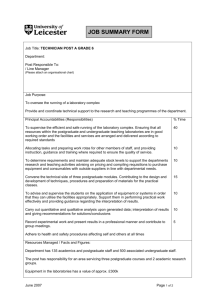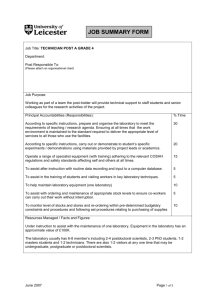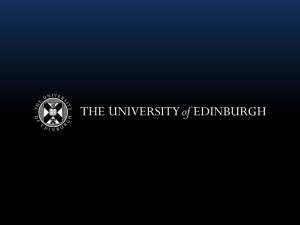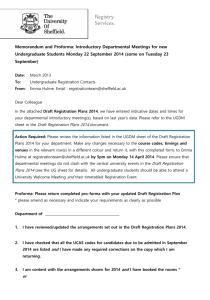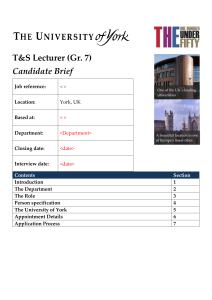Faculty of AgriSciences
advertisement
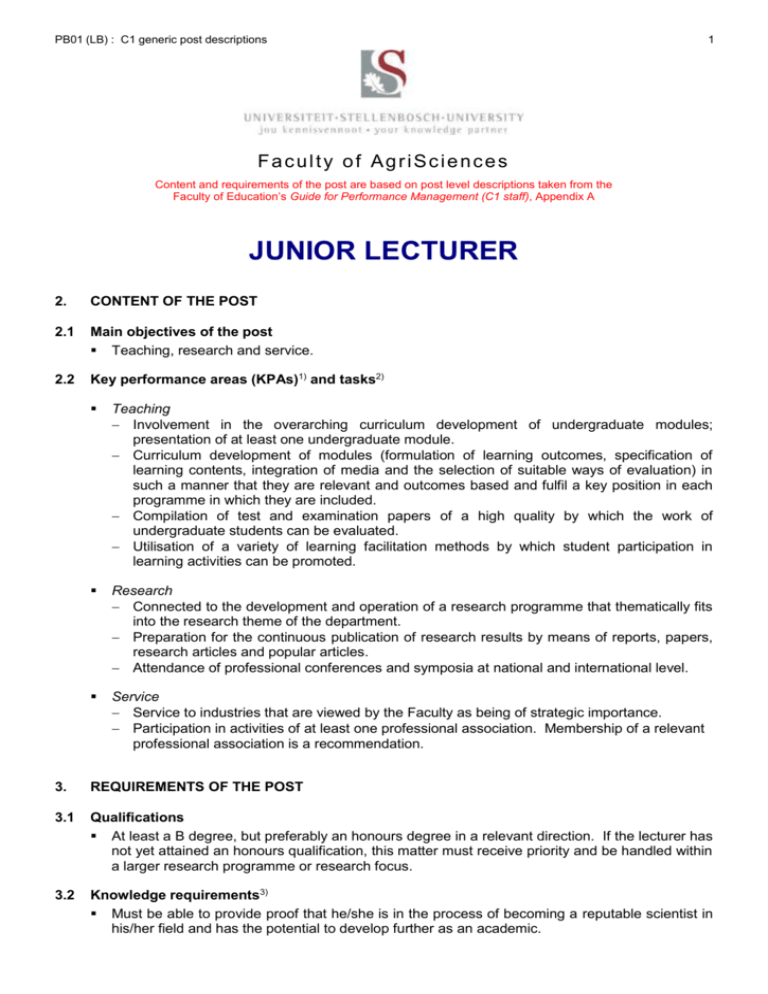
PB01 (LB) : C1 generic post descriptions 1 Faculty of AgriSciences Content and requirements of the post are based on post level descriptions taken from the Faculty of Education’s Guide for Performance Management (C1 staff), Appendix A JUNIOR LECTURER 2. CONTENT OF THE POST 2.1 Main objectives of the post Teaching, research and service. 2.2 Key performance areas (KPAs)1) and tasks2) Teaching Involvement in the overarching curriculum development of undergraduate modules; presentation of at least one undergraduate module. Curriculum development of modules (formulation of learning outcomes, specification of learning contents, integration of media and the selection of suitable ways of evaluation) in such a manner that they are relevant and outcomes based and fulfil a key position in each programme in which they are included. Compilation of test and examination papers of a high quality by which the work of undergraduate students can be evaluated. Utilisation of a variety of learning facilitation methods by which student participation in learning activities can be promoted. Research Connected to the development and operation of a research programme that thematically fits into the research theme of the department. Preparation for the continuous publication of research results by means of reports, papers, research articles and popular articles. Attendance of professional conferences and symposia at national and international level. Service Service to industries that are viewed by the Faculty as being of strategic importance. Participation in activities of at least one professional association. Membership of a relevant professional association is a recommendation. 3. REQUIREMENTS OF THE POST 3.1 Qualifications At least a B degree, but preferably an honours degree in a relevant direction. If the lecturer has not yet attained an honours qualification, this matter must receive priority and be handled within a larger research programme or research focus. 3.2 Knowledge requirements3) Must be able to provide proof that he/she is in the process of becoming a reputable scientist in his/her field and has the potential to develop further as an academic. PB01 (LB) : C1 generic post descriptions 3.3 2 Must provide proof that he/she can initiate and execute research with limited peer guidance. Knowledge of the broader US structure, policies and procedures. Skills requirements4) Ability to communicate fluently in Afrikaans and English. Ability to communicate effectively with students, colleagues and clients, both verbally and in writing. Positive and innovative predisposition to learning and learning facilitation. Conscientiousness and precision. Must be able to utilise communication and information technology for teaching and learning (Web-CT). PB01 (LB) : C1 generic post descriptions 3 Faculty of AgriSciences LECTURER 2. CONTENT OF THE POST 2.1 Main objectives of the post Teaching, research and service. 2.2 Key performance areas (KPAs)1) and tasks2) Teaching Involvement in the overarching curriculum development of undergraduate and postgraduate modules; presentation of at least two undergraduate and one postgraduate module. Curriculum development of modules (formulation of learning outcomes, specification of learning contents, integration of media and the selection of suitable ways of evaluation) in such a manner that they are relevant and outcomes based and fulfil a key position in each programme in which they are included. Compilation of test and examination papers of a high quality by which the work of undergraduate and postgraduate students can be evaluated. Utilisation of a variety of learning facilitation methods by which student participation in learning activities can be promoted. Study guidance for students at honours and master’s level and maintenance of a good throughput rate. Guidance for students at honours and master’s level to publicise the results of their research by means of reports, papers and articles. Research Development and operation of a research programme that thematically fits into the research theme of the department. Development of greater research capacity through student recruitment and fundraising. Obtaining NRF grading. Continuous publication of research results by means of reports, papers, research articles and popular articles. Attendance of professional conferences and symposia at national and international level. As the author, maintain an average of 0.5 publication units per year in an accredited professional journal. Service Service to industries that are viewed by the Faculty as being of strategic importance. Participation in activities of at least one professional association. Membership of a relevant professional association is a recommendation. Involvement in at least one departmental committee. Involvement in a Standing Committee of the Faculty Board is desirable. PB01 (LB) : C1 generic post descriptions 4 3. REQUIREMENTS OF THE POST 3.1 Qualifications At least a master’s degree, but preferably a doctorate in a relevant direction. If the lecturer has not yet attained a doctorate, this matter must receive priority and be handled within a larger research programme or research focus. 3.2 Knowledge requirements3) Must be able to provide proof that he/she is in the process of becoming a reputable scientist in his/her field and has the potential to develop further as an academic. Must provide proof that he/she can initiate and execute research with limited peer guidance. Knowledge of the broader US structure, policies and procedures. 3.3 Skills requirements4) Ability to communicate fluently in Afrikaans and English. Ability to communicate effectively with students, colleagues and clients, both verbally and in writing. Positive and innovative predisposition to learning and learning facilitation. Conscientiousness and precision. Must be able to utilise communication and information technology for teaching and learning (Web-CT). PB01 (LB) : C1 generic post descriptions 5 Faculty of AgriSciences SENIOR LECTURER 2. CONTENT OF THE POST 2.1 Main objectives of the post Teaching, research and service. 2.2 Key performance areas (KPAs)1) and tasks2) Teaching Involvement in the overarching curriculum development of undergraduate and postgraduate modules; presentation of at least two undergraduate and one postgraduate module. Curriculum development of modules (formulation of learning outcomes, specification of learning contents, integration of media and the selection of suitable ways of evaluation) in such a manner that they are relevant and outcomes based and fulfil a key position in each programme in which they are included. Compilation of test and examination papers of a high quality by which the work of undergraduate and postgraduate students can be evaluated. Utilisation of a variety of learning facilitation methods by which student participation in learning activities can be promoted. Study guidance for students at honours, master’s and doctoral level and maintenance of a good throughput rate. Guidance for students at honours, master’s and doctoral level to publicise the results of their research by means of reports, papers and articles. Research Development and operation of a research programme that thematically fits into the research theme of the department. Development of greater research capacity through student recruitment, fundraising and contract research. Obtaining NRF grading. Continuous publication of research results by means of reports, papers, research articles and popular articles. Attendance of professional conferences and symposia at national and international level. Development of national as well as international networks and partnerships. Provide advice to junior lecturers and lecturers in the department in order to establish and develop teaching and research expertise. As the author, maintain an average of 1.0 publication units per year in an accredited professional journal. Service Service to industries that are viewed by the Faculty as being of strategic importance. Participation in activities of at least one professional association. Membership of a relevant professional association is a recommendation. Involvement in at least one departmental and faculty committee. Involvement in a Standing Committee of the Faculty Board is desirable. PB01 (LB) : C1 generic post descriptions 6 3. REQUIREMENTS OF THE POST 3.1 Qualifications At least a doctorate in a relevant direction or, in exceptional cases, a master’s degree supported by published research, or an equivalent professional qualification, or another qualification supported by research articles that is comparable to a doctorate. 3.2 Knowledge requirements3) An academically excellent study record. The results of the doctoral research project have been reported in accredited professional journals and have made an important contribution to the specific subject field. Must be able to participate with authority in a forum of academics in his/her field of specialisation. Knowledge of the broader US structure, policies and procedures. 3.3 Skills requirements4) Ability to communicate fluently in Afrikaans and English. Ability to communicate effectively with students, colleagues and clients, both verbally and in writing. Positive and innovative predisposition to learning and learning facilitation. Conscientiousness and precision. Must be able to utilise communication and information technology for teaching and learning (Web-CT). Ability to innovatively apply the evaluation of student learning at different levels. Ability to promote a culture of research through an intensification of the research focus. PB01 (LB) : C1 generic post descriptions 7 Faculty of AgriSciences ASSOCIATE PROFESSOR 2. CONTENT OF THE POST 2.1 Main objectives of the post Teaching, research and service. 2.2 Key performance areas (KPAs)1) and tasks2) Teaching Involvement in the overarching curriculum development of undergraduate and postgraduate modules; presentation of at least two undergraduate and one postgraduate module. Curriculum development of modules (formulation of learning outcomes, specification of learning contents, integration of media and the selection of suitable ways of evaluation) in such a manner that they are relevant and outcomes based and fulfil a key position in each programme in which they are included. Compilation of test and examination papers of a high quality by which the work of undergraduate and postgraduate students can be evaluated. Utilisation of a variety of learning facilitation methods by which student participation in learning activities can be promoted. Study guidance for students at honours, master’s and doctoral level and maintenance of a good throughput rate. Guidance for students at honours, master’s and doctoral level to publicise the results of their research by means of reports, papers and articles. Provision of co-supervision or supervision, or act as external examiner for master’s or doctoral students from other universities. Research Development and operation of a research programme that thematically fits into the research theme of the department. Development of greater research capacity through student recruitment, fundraising and contract research. Obtaining NRF grading. Continuous publication of research results by means of reports, papers, research articles and popular articles. Attendance of professional conferences and symposia at national and international level. Development of national as well as international networks and partnerships. Provide advice to junior lecturers and lecturers in the department in order to establish and develop teaching and research expertise. As the author, maintain an average of 1.5 publication units per year in an accredited professional journal. Service Service to industries that are viewed by the Faculty as being of strategic importance. Participation in activities of at least one professional association. Membership of a relevant professional association is a recommendation. PB01 (LB) : C1 generic post descriptions 8 Participation in management-related activities by making committee contributions at all levels (departmental, faculty and institutional), as well as at inter-institutional level. 3. REQUIREMENTS OF THE POST 3.1 Qualifications A doctorate in a relevant direction. 3.2 Knowledge requirements3) An academically excellent study record. Knowledge of the broader US structure, work methods, policies, procedures and functioning. 3.3 Skills requirements4) Ability to communicate fluently in Afrikaans and English. Ability to communicate effectively with students, colleagues and clients, both verbally and in writing. Positive and innovative predisposition to learning and learning facilitation. Conscientiousness and precision. Must be able to utilise communication and information technology for teaching and learning (Web-CT). Ability to innovatively apply the evaluation of student learning at different levels. Ability to promote a culture of research through an intensification of the research focus. PB01 (LB) : C1 generic post descriptions 9 Faculty of AgriSciences First version of generic description of the post: January 2004 Revised version of description of the post: [Kliek hier en tik datum] PROFESSOR 2. CONTENT OF THE POST 2.1 Main objectives of the post Teaching, research and service. 2.2 Key performance areas (KPAs)1) and tasks2) Teaching Involvement in the overarching curriculum development of undergraduate and postgraduate modules; presentation of at least two undergraduate and one postgraduate module. Curriculum development of modules (formulation of learning outcomes, specification of learning contents, integration of media and the selection of suitable ways of evaluation) in such a manner that they are relevant and outcomes based and fulfil a key position in each programme in which they are included. Compilation of test and examination papers of a high quality by which the work of undergraduate and postgraduate students can be evaluated. Utilisation of a variety of learning facilitation methods by which student participation in learning activities can be promoted. Act in an advisory capacity towards colleagues in the department in order to establish and develop teaching and research expertise. Study guidance for students at honours, master’s and doctoral level and maintenance of a good throughput rate. Guidance for students at honours, master’s and doctoral level to publicise the results of their research by means of reports, papers and articles. Provision of co-supervision or supervision, or act as external examiner for master’s or doctoral students from other universities. Research Development and operation of a research programme that thematically fits into the research theme of the department. Development of greater research capacity through student recruitment, fundraising and contract research. Obtaining NRF grading. Continuous publication of research results by means of reports, papers, research articles and popular articles. Attendance of professional conferences and symposia at national and international level. Development of national as well as international networks and partnerships. As the author, maintain an average of 1.5 publication units per year in an accredited professional journal. PB01 (LB) : C1 generic post descriptions 10 In cooperation with the Departmental Chairperson, develop a complete research plan (objectives, resources, budget, schedule, outputs and control structure) at departmental level. In cooperation with the Departmental Chairperson, develop mechanisms for research quality promotion and assurance in order to coordinate and promote the research activities of the department. In cooperation with the Departmental Chairperson, develop effective management of resources (time, space, funds, facilities, etc.). Provide advice to colleagues in the department in order to establish and develop teaching and research expertise. Service Service to industries that are viewed by the Faculty as being of strategic importance. Participation in activities of at least one professional association. Membership of a relevant professional association is a recommendation. Participation in management-related activities by making committee contributions at all levels (departmental, faculty and institutional), as well as at inter-institutional level. 3. REQUIREMENTS OF THE POST 3.1 Qualifications A doctorate in a relevant direction. 3.2 Knowledge requirements3) An academically excellent study record. Knowledge of the broader US structure, work methods, policies, procedures and functioning. Proven competence and leadership in curriculum development at different levels, programme renewal and programme maintenance, creation of learning and learning evaluation opportunities of a high quality, as well as the promotion of a culture of learning among students. Proven competence and leadership in the provision of academic guidance to students, development of critical and creative thinking, and ability to inspire students to cultivate an academic predisposition and to undertake postgraduate study. An ability to establish and promote both national and international networks for teaching excellence. Amongst others, his/her status is reflected by acting as moderator and examiner in a national and international context. 3.3 Skills requirements4) Writing proposals for research awards and obtaining access to outside funds, including international funds, for research. Writing research reports. Possessing the leadership and management potential to act as departmental chairperson. Ability to constructively participate in new initiatives of the Faculty. Ability to communicate fluently in Afrikaans and English. Ability to communicate effectively with students, colleagues and clients, both verbally and in writing. Positive and innovative predisposition to learning and learning facilitation. Conscientiousness and precision. Must be able to utilise communication and information technology for teaching and learning (Web-CT). Ability to innovatively apply the evaluation of student learning at different levels. Ability to promote a culture of research through an intensification of the research focus.

